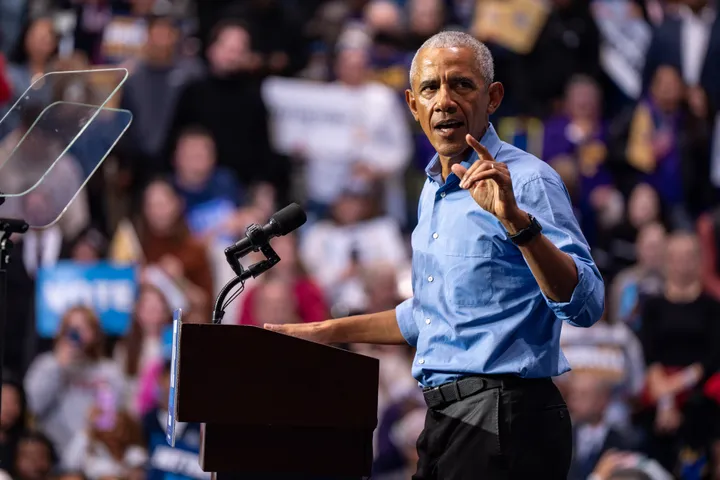Less than a month into Donald Trump’s return to the White House, his administration is already facing a wave of lawsuits challenging key executive orders and policy decisions.
Several of these lawsuits challenge executive actions purportedly designed to overhaul federal bureaucracy, redirect funding, and reshape immigration policies.
Meanwhile, lawsuits have also surfaced over tech mogul Elon Musk’s role in the newly established Department of Government Efficiency (DOGE), with critics arguing it violates federal transparency laws.
Court order
On Sunday, the Trump administration urged the Supreme Court to allow the dismissal of the head of a federal agency responsible for protecting whistleblowers, after lower courts blocked the move.
District Judge Amy Berman Jackson ruled that Trump had "plainly" violated the law by firing the ethics official. According to the Associated Press, this marks the first case of Trump’s second administration to reach the nation’s highest court.
Lawsuits and policies
The Trump administration moved to to freeze federal funds while reassessing spending priorities, triggering legal challenges from nonprofits, public health organizations, and Democratic-led states. A federal judge in Rhode Island signalled a willingness to block the freeze, citing concerns that it could still affect funding in practice, even after the White House rescinded the order.
One of Trump’s executive orders, which reclassifies federal employees under “Schedule F” to make it easier to hire and fire them, has attracted multiple lawsuits. Unions argue that the move undermines protections granted by Congress and threatens the neutrality of federal agencies.
Another executive order seeks to eliminate birthright citizenship. At least four federal judges have blocked Trump’s order, marking one of the first significant legal setbacks for his second administration. Additional lawsuits challenge new asylum restrictions, raids on sanctuary cities, and limitations on immigration-related grants.
Civil rights groups have filed lawsuits over Trump’s executive order requiring the Federal Bureau of Prisons to house transgender inmates according to their sex at birth and denying them access to gender-affirming healthcare. Other lawsuits also challenge Trump’s restrictions on diversity, equity, and inclusion policies.
Elon Musk and DOGE
Trump’s decision to rename the US Digital Service as the Department of Government Efficiency, or DOGE, and appoint Elon Musk to lead it has also sparked multiple lawsuits.
Critics argue that DOGE should be classified as a federal advisory board, which would require compliance with transparency laws. Other legal challenges focus on DOGE’s access to federal data, particularly at the Department of Labor.
What does this mean?
With numerous lawsuits in progress, it’s likely that some will reach the Supreme Court, particularly those involving immigration, funding authority, and civil service protections.
Despite the conservative-leaning court, legal experts suggest that some of Trump’s orders—such as the funding freeze—could be struck down for overstepping executive authority.
Similarly, Musk’s DOGE could face judicial scrutiny if courts determine it operates outside federal transparency requirements. However, no immediate rulings have been issued on these matters.
This ongoing legal battle highlights the friction between Trump’s governance style and established federal regulations, with lawsuits likely shaping the direction of his administration’s policies.
Timeline
February 16: The Trump administration asks the Supreme Court to allow the firing of a federal whistleblower protection agency chief, but District Judge Amy Berman Jackson rules the move illegal.
February 14: Judge John Bates rules in favour of Elon Musk’s DOGE, declining to block its access to data at the Consumer Financial Protection Bureau, Labor, and Health Departments, despite “serious concerns.”
February 13: A federal judge orders the temporary lifting of a foreign aid freeze, ruling the administration had given no justification for the hold. 14 states, led by New Mexico, sued Trump, Musk, and DOGE, arguing Musk’s federal influence was unconstitutional and had caused “mass confusion.”
Judge Brendan A. Hurson blocks Trump’s restrictions on transgender healthcare for minors.
Trump’s birthright citizenship rollback is blocked for the fourth time.
Judge Carl Nichols extends a ruling stopping the Trump administration from placing 2,200 USAID employees on leave.
Pennsylvania Governor Josh Shapiro sues Trump administration over the "unconstitutional" withholding of $2 billion in federal funds, despite a previous court order to release them.
February 12: A judge lifts a block on a federal employee buyout program, ruling that labour unions lacked standing to challenge it.
A group of eight former internal government watchdogs, who were fired by President Trump, file a lawsuit challenging their terminations. They claim Trump violated rules that require Congress to be notified before their dismissal.
February 11: The 1st Circuit Court of Appeals upholds a block on Trump’s federal spending freeze, forcing the administration to restore frozen funds.
Judge John Bates orders federal health agencies to restore deleted datasets after a lawsuit by Doctors for America.
NGOs and small businesses sue Trump over the plan to phase out USAID, alleging it violates the separation of powers.
Judge Mary Page Kelley temporarily halts an NIH policy capping indirect research funding at 15 percent, after 22 states filed a lawsuit challenging the order.
Judge Joseph LaPlante, blocks Trump’s new birthright citizenship rule, marking the third court ruling against it.
February 9: Judge Paul Engelmayer blocks Elon Musk's Department of Government Efficiency (Doge) from accessing the personal financial data of millions of Americans in Treasury Department records. The move came after 19 state attorneys general sued the Trump administration after Doge, a cost-cutting initiative led by Musk, was given access to the records.
February 7: The University of California Student Association sues the Education Department, accusing DOGE of illegally accessing financial data on 42 million student loan borrowers.
The Justice Department agrees to withhold FBI agents’ names in the January 6 probe, pending legal review.
February 6: Judge John Coughenour extends a pause on Trump’s birthright citizenship rollback, ruling that “the President cannot alter a constitutional right via executive order.”
February 5: Judge Deborah L. Boardman becomes the second judge to block Trump’s birthright citizenship repeal, siding with nonprofits representing undocumented women.
January 23: Judge Coughenour issues the first major ruling against Trump’s second term, blocking the birthright citizenship order.
January 20: Minutes after Trump’s inauguration as the 47th US President, public interest firm National Security Counselors files the first lawsuit, demanding that DOGE be classified as a federal advisory board subject to transparency laws.
➤ Click here to follow our WhatsApp channel for more stories.






















